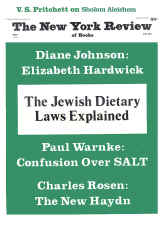In response to:
Hoover Makes a Comeback from the March 8, 1979 issue
To the Editors:
Arthur Schlesinger, Jr.’s trenchant critique of the Hoover revisionists [NYR, March 22] came as a welcome antidote to the tendency among some historians to transform Herbert Hoover into the tragic hero of the Depression Era, and his American Individualism into a tract for our times. However, in attempting to redress the historical balance in favor of the New Deal as a radical departure from the Hooverian past, Schlesinger tips the scale too heavily in Roosevelt’s behalf.
The major argument Schlesinger makes in defense of his thesis that Hoover’s anti-depression programs did not foreshadow the New Deal is that the genuine progressives in the Republican Party, such as Senators Norris and La Follette, who allegedly became staunch supporters of Roosevelt, were politically at odds with Hoover on some fundamental issues. The problem with this approach is that of the four issues which Schlesinger cites as dividing Hoover and the progressives (Muscle Shoals, direct federal relief to the unemployed, the rights of labor, and the Smoot-Hawley tariff), the last two also divided Roosevelt and the progressives. Schlesinger’s observation that Hoover was not a prime mover behind the Norris-LaGuardia Anti-Injunction Act is disingenuous to say the least, because he fails to include Roosevelt as a reluctant supporter of labor’s right to organize as set forth in section 7(a) of the NIRA. Furthermore, the Hoover-backed ultra-protectionist tariff act was never seriously challenged by Roosevelt. It remained the law throughout the entire New Deal era.
Opposition to Roosevelt and the New Deal from the left ran so high throughout the Thirties, that progressives were constantly threatening to form a farmer-labor party. One would never know from Schlesinger’s review, which seeks to wed the progressives to the New Deal program, that La Follette actually launched a third party in 1938 in defiance of Roosevelt’s wishes.
As President, Hoover did take certain steps which anticipated early New Deal initiatives in areas of industrial and agricultural recovery, reform of the banking system and the stock market, and credit expansion.
Both Hoover and Roosevelt turned total control of the economy over to big business in their initial efforts to stimulate industrial recovery. The only significant difference between Hoover’s reliance on trade associations and Roosevelt’s faith in industrial self-government to regulate production, prices, and wages in the public interest was that the former scheme depended on voluntary action, whereas the latter mandated compulsory cartelization. The fate of small business, and more so, labor, under the Blue Eagle revealed the NRA, not the trade association, as the true embodiment of “business syndicalism with a vengeance.”
By the same token, Hoover’s program to deal with the over-production crisis in agriculture was a direct precursor to the New Deal’s AAA. By encouraging farmers to join co-operatives, by buying up their surpluses and extending them loans, Hoover’s Federal Farm Board fell just short of the ultimate Rooseveltian solution: crop destruction and planned scarcity.
The Emergency Banking Act, which restructured the banking system, was formulated by Hoover hold-overs in the Treasury Department. The regulation of the stock exchange, which was imposed by the Securities Act and administered by the SEC, was made possible by the disclosures and recommendations of the Hoover-era Pecora committee. Pecora’s indictment of Wall Street for its irresponsible financial machinations met with Hoover’s complete approval. Before the advent of the New Deal, Hoover had begun expanding the credit supply to businesses, building and loan associations, land banks, and state governments.
My point is not that Hoover was a progressive, but that he was not the dyed-in-the-wool reactionary that Schlesinger portrays. If the progressives didn’t consider Hoover as one of their own, neither did they identify with Roosevelt. Continuity between Hoover’s policies and those of the early New Deal existed in the specific areas I mentioned. Unfortunately, Schlesinger’s adulation of Roosevelt and the New Deal compels him to distort historical reality to suit his political bias.
Bennett Muraskin
Jersey City, New Jersey
Jr. Arthur Schlesinger replies:
I am not sure that Mr. Muraskin has got things quite right. Roosevelt was not a “reluctant” supporter of labor’s right to organize nor of the celebrated Section 7 (a); possibly Mr. Muraskin is confusing 7 (a) with the Wagner labor relations bill, of which even Frances Perkins was originally, if unwarrantedly, wary. As for challenging Hoover’s protectionist tariff policy, Mr. Muraskin appears to have inexplicably forgotten the Reciprocal Trade Agreements Act of 1934. The Pecora investigation was not a “Hoover-era” affair. Pecora became counsel for the Senate Banking and Currency Committee two months after Hoover’s defeat. The La Follette third party in 1938, as the Maney biography made clear, was not launched by Robert La Follette in defiance of Roosevelt’s wishes but by Philip La Follette in defiance of Robert’s wishes. If the NRA really “turned total control of the economy over to big business,” one wonders why at the end business was so pleased and labor so angered when the Supreme Court declared NRA unconstitutional. While progressives like Norris and La Follette did not approve of every New Deal policy, they never doubted—as the biographies under review abundantly show—that Roosevelt was their friend and Hoover their enemy.
This Issue
June 14, 1979



